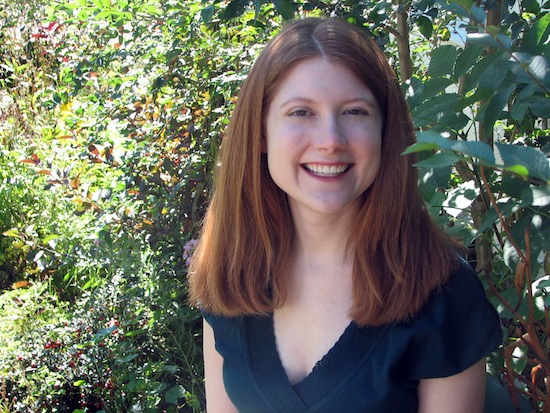After death, novelist’s longtime dream comes true

Bridget Zinn did not survive to see her novel published, but the UW–Madison alumna’s book is a living testament to her “head-over-heels” love of writing.
Photo courtesy of Barrett Dowell
Bridget Zinn always wanted to be a published novelist. Her dream is finally coming true — nearly two years after the UW–Madison alum died of colon cancer.
“This is something really good coming out of something really bad,” says her husband and fellow UW grad Barrett Dowell.
It was a long journey to publication for Zinn, who earned both her undergraduate degree in theatre and drama and a master’s degree in library and information studies at UW–Madison. But she didn’t give up.
“She even celebrated rejection,” Barrett says. “That meant someone read her work.”
“Poison,” a young adult novel, was recently released by Disney Hyperion, almost four years to the day after her diagnosis.

The book is the story of 16-year-old Kyra, a highly-skilled potions master who must save her kingdom from destruction. Kyra came to Zinn in a dream, but the inspiration had been building for years. Zinn had long been an avid reader and writer, penning stories ever since she was a child. Soon after getting the news that “Poison” would be published, she was diagnosed with colon cancer.
The news was a shock. She didn’t drink or smoke and was a vegetarian. And she was only 31.
Zinn and Barrett got married. In the hospital. Not exactly the way they’d pictured but, in true Bridget style, they christened that summer the “summer of love” and celebrated with several more weddings.
Zinn grew up in Bennet, Wis., and Barrett in neighboring Poplar. They met at the Douglas County Fair and were soon inseparable. After graduating from the UW, they made their home in Portland, Ore.
Books had long been a source of comfort for Zinn, as well as writing. That didn’t change after her diagnosis.
“She really struggled with wanting to mix her professional voice on her blog and her illness,” Barrett says. “She didn’t want to be thought of as sick. She wanted to be thought of as a writer.”
Writing came naturally to Zinn.
“I fell really and truly head-over-heels-in-love with writing,” she wrote on her blog. “It was a great escape from my job and, even when I quit that job and moved on to more satisfying work, it was still absolutely perfect for me. In what other job do you get to spend your days living through crazy high-jinx, falling in love, making cool friends and having damn fine adventures? Writers get to create a world with each novel — a fun, gorgeous, tantalizing world with inhabitants who crack you up.”
One of her fears was to be left somewhere without a book. Barrett laughs at the library fines they’d rack up — an expense that seemed easy to justify.
“In what other job do you get to spend your days living through crazy high-jinx, falling in love, making cool friends and having damn fine adventures?”
Bridget Zinn
“She had always been a book lover,” Barrett says. “Wherever she went, she always grabbed a book.”
As a library student, Zinn worked at the Cooperative Children’s Book Center (CCBC) in Madison. Last summer, the Friends of the CCBC launched the inaugural Bridget Zinn Film Festival as part of a special literacy program at Whitehorse Middle School funded by the School of Education’s Partner School Network. The festival taught students the basic techniques of storyboarding, filmmaking and editing by creating trailers for books selected for Read On Wisconsin.
“We thought it was perfect to name the film festival after Bridget,” says Kathleen T. Horning, director of the CCBC.
Zinn didn’t just have an enthusiasm for books. She had an enthusiasm for life.
“She was just always the bubbliest, happiest person but not in a Pollyanna kind of way,” Horning says. “Bridget was optimistic and upbeat. She loved to laugh.”
Horning can see Zinn in every word of “Poison.”
“Her voice is completely in the book,” Horning says. “To read the book is like having a conversation with Bridget.”
Publishers Weekly says, “The late Zinn’s debut novel unfolds as a romping, fairy-tale quest with more than one twist up its sleeve. The story is vivid, headlong, and occasionally tongue in cheek, and the narrative’s dark moments never get too scary because everything else is so much fun.”
More than 150 people attended the film festival. The second annual Bridget Zinn Film Festival is scheduled for this summer.
Books remained a source of comfort to Zinn right up until she died May 25, 2011, at the age of 33. The night before, Barrett read her “What Happened to Goodbye” by Sarah Dessen, one of her favorite authors.
“Bridget was falling in and out of sleep and I thought the sound of my voice might comfort her and help keep her grounded,” Barrett says. “I sat next to her bed and rested my hand on her leg and began to read.”
They finished reading the book just before 2 a.m.
“I told her she was safe and kissed her goodnight and a few hours later a nurse woke me up to tell me Bridget had passed,” Barrett says.
Yes, Bridget Zinn had cancer. But before cancer, during cancer and even after cancer, she was a writer.
“It’s so fantastic to see so many people talk about her book,” Barrett says. “It’s such a wonderful legacy for her to have left all of us.”




